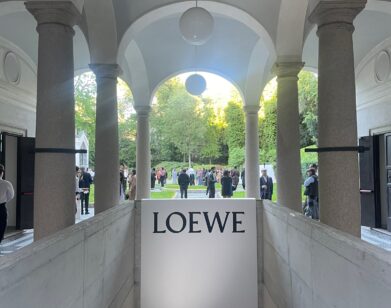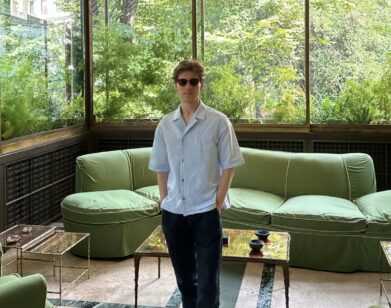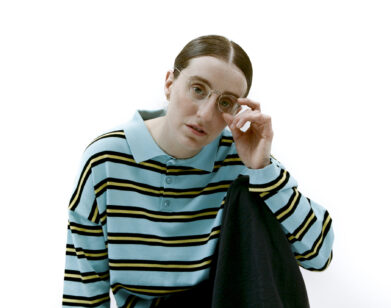The Expansive David Mitchell

ABOVE: DAVID MITCHELL
“A story must move,” says a character in David Mitchell’s singular and moving historical novel from 2004, The Thousand Autumns of Jacob de Zoet, “and misfortune is motion.” But, though the speaker is a monastic scribe (in 1799 Nagasaki), he claims his craft is of the more mundane variety. “Storytellers are not priests who commune with an ethereal realm,” he says, “but artisans, like dumpling makers, if somewhat slower. To work, then, until the lamp drinks itself dry…”
By now you may have heard of, if not read, Mitchell’s wondrously fantastical work, and I am not giving away too much to say that one of the delightful ironies of this last sentiment is that the monk’s lamp will presumably never really run dry: he is a member of an order of vampiric immortals who drink the blood of babies to maintain their youth. (Could a writer other than Mitchell elicit with such a description a coy glint rather than roll his reader’s eye?) And you will also know that Mitchell’s stories surely and splendidly move, often fueled by misfortune, to and fro across millennia, back and forth around the world, and through an interlocking multiverse of his own making—and that the books themselves are but chapters in an ever-growing ur-book. His latest, The Bone Clocks, out now from Random House, may be his grandest, most totemic installment, unifying the small-town England of his semi-autobiographical Black Swan Green with the wicked immortals of Jacob de Zoet on the same scale as his enormously popular Cloud Atlas. It also has one of the more terrifying near-future dystopias I’ve ever read. And, when I spoke to him on the phone in mid-September, Mitchell did nothing to allay my fears about the end of the world.
CHRISTOPHER WALLACE: Where are you in the world?
DAVID MITCHELL: I’m in a hotel in San Diego. It’s a very beautiful blue outside, lovely and warm. I’m only about 45 minutes from Mexico, but I have not yet encountered any Mexican clichés. No drug-cartel action as yet.
WALLACE: Yet. [laughs] No, I’m sure you’ll be safe and sound there. But let’s dive in off that board. Power—whether in the employ of a cartel, or a vampiric cult in Edo-era Japan, as the case may be—seems to be the fundamental currency of your many worlds. The terror that it produces in those less powerful is very often the animating force for your protagonists, and the inevitable corruption of, or indulgence in, or the wickedness with which they deploy power in those more possessing of it, seems to create the tension of this unified Mitchell-verse. Where does that come from? Do you have an abiding fascination with power, or is its primacy just some truism about our human nature?
MITCHELL: It might be a truism but that doesn’t necessarily mean it’s not worth thinking about or talking about. We’re all interested in power. The moment some kid in the schoolyard tells you what to do, you find yourself coerced into obeying. It might be teachers, and then bosses, or even power exchanges that go on within a marriage. Isn’t to be alive to be either prey or preyed upon, to some degree, metaphorically, all the time? This is where we live, like a fish lives in water. It is one of those elemental themes that come with life.
WALLACE: One of the takeaways from your treatment of it—your exploding of it, the way that you place the bullying of a schoolboy next to Colonialism—is that those exertions of power are revealed to be more of a difference of degree than of a kind.
MITCHELL: That makes complete sense, yeah. The archetypal relationship between the prey and the preyed-upon is pretty identical in whatever manifestation it takes. Of course the textures, accents, and the skin tones, and the consequences for challenging that power differ. But there is something really archetypal and fundamental about it.
WALLACE: You seem to have this zoomed-out vision—not just of the globe, but also across millennia, with this almost anthropological eye. And, through that lens, we do fit into the animal kingdom, and are thus obviously subject to the same laws of dominance and survival. But, even if you view this system with a wry eye, all of your protagonists become heroes, when they do, because they are able to achieve some quantum of power. They are able to defeat the bully on the bully’s own turf.
MITCHELL: I liked what you say about the anthropologist’s eye, and I’d like to think that I think like an anthropologist. But perhaps in the context of what you’re saying about different species, maybe I have one anthropologist’s eye and one a zoologist’s eye—that would be an interesting face to pull. [Wallace laughs] But, regarding heroism being needed and then achieved by those who choose not be a victim any longer—does not that feel like your own life?
WALLACE: [pauses] I’m not sure. I do think that is the way that we understand ourselves in relation to power…
MITCHELL: I suppose so—that to be alive is to be subject to other peoples’ terms a lot of the time. Even if you obey the law, you are modifying your behavior according to terms that are not dictated by you.
WALLACE: Speaking of which: in our era, where we’re all taught to humanize the villains and empathize with our characters, you do have out-and-out baddies. You do have Don Johns in your books.
MITCHELL: Who are you thinking of, sir?
WALLACE: [laughs] The abbot in Jacob de Zoet, for example.
MITCHELL: Well, he’s probably the best example in your case. Although, like the Anchorites from The Bone Clocks, to whom he might be closely related, he would say, “Look, all I’m trying to do is what you’re trying to do every day, survive. I’ve got to get some occult means of survival, but so what? They are so many human beings in the world, and I take so few compared to your average dictator, your average warlord, or the administration of North Korea. I’m a pretty small fry compared to them.” But, to rationalize, unless you’re vegetarian, hundreds—probably thousands—of sentient animals have died [because of you], and they didn’t want to die. “You’re all directly responsible for their deaths. You’ve eaten them, and paid people to kill them. If you’re just going on units of life forms killed, what’s to say we’re guiltier than you?” That’s what he would say, and what the Anchorites maintain. And that’s not an invalid point.
WALLACE: Many of your protagonists begin as outsiders seeking inclusion—whether it is into the group of the cool kids, or acceptance into a society, their departed father’s love, or onto a list of great musicians. And the way they go about that—finding a command for language, or, in some cases, just by incredible force of will—is really appealing. Is that search for belonging just the natural reaction to this other thing that I’ve just enforced on you [laughs], this power theme, as a way of protecting the self, looking for kindred spirits, safety in the herd—or not?
MITCHELL: [laughs] I think, if I’m forced to choose, I’d say probably not. I think both those themes are there for sure, and I didn’t quite notice that about many of my major characters, that they’re on an arc toward belonging, but now that you mention it, you’re absolutely right. They want to belong. They are loners, and not particularly happy loners. Maybe that’s a description of me as a kid, and lots of us as kids actually—I don’t think I’m that special. If you’re bookish, you’re already somewhat out of the cool kids, unless you’re in a kind of educational milieu where it’s cool to be bookish. And isn’t it cute how I still keep translating [my experience] to the arcs of my characters?
WALLACE: Well, I’ve set you up here, I’m afraid, because now I am going to ask you about your deafening fame and popularity. You more than belong, now, on this huge global level. And you handle it very well—you perform really well at book fairs, in interviews, et cetera. Is that an entirely different part of you than the one who’s at home working on the Tolkienesque “compost heap” in your little room?
MITCHELL: My word, quoting me—hoisted by my own petard. We are the way we are when we’re teenagers, but happily we continue to evolve the whole of our lives. I’m sure you’re not the same now. What was true about 17-year-old Chris—just because it’s different now, doesn’t mean it wasn’t true then, right? And maybe the metaphor is not an evolving species but more of a tree. Because the 17-year-old stuff is in there and there’s a two millimeter level of growth within the 17-year-old pine tree that’s still there in it’s broader, thicker, stronger 37-year-old version of itself. Of course, there is 20 years of growth between them. As people, too, it’s still there. A human being is an interconnected system of colonies of different life forms that evolve symbiotically —the mitochondria in our eyes that enable us to see were once outside us; they weren’t a part of human beings; they evolved into our eyes. We’re a little empire of cells. Another thing, the reflexive pronoun “myself” is actually a tautology. We always say “my-selves,” because we can’t possibly be the same hotheaded idiot who said what he said in that argument, who has left the trail of decades behind us; a different self had the upper hand then, and now the more reticent, thoughtful self has arrived. But they’re all you. So I’d like to have my cake and eat it, if I may: [These facets of self] do not contradict each other, because we are contradictory beings.
WALLACE: But as we’re packing on new growth to the tree, isn’t it true that there are parts of that tree that, given opportunities, would flourish? Might 11-year-old David Mitchell have been a phenomenal stage presence and global star-in-the-making if given the chance? Or is that all grafted on, mitochondrially?
MITCHELL: [laughs] I’m not a global star, that’s silly. Just ask my wife. But, thank you. But I know that the 11-year-old me could not have gone onto the stage because he could not have gotten a sentence out with stammering and running off the stage in a state of mortification. You have to evolve this. It’s how I make a living, pay my mortgage, and feed my children. You do need to be able to put on something of a show.
WALLACE: And you seem to rather delight, in The Bone Clocks, in skewering a contemporary literary star, in the character of Crispin Hershey. Now, you’ve spoken about immortality being a wonderful carrot, this wonderful lure for a character—in lieu of, say, Scrooge McDuck money. Was there some deep, dark, despairing night of the soul in your 20s when you were smoking cigarettes and reading Camus, all angsty about death, that inspired this attraction to immortality?
MITCHELL: It was more of a slow-motion fading. As you reach middle age, you know you’re going to die in a different way than you did in your 20s. A few contemporaries are already dead—a handful of people I was in school with have had unwelcomed diagnoses, and one of them has died. And this little steel rod taps the musical triangle of your mortality awareness, one that says, “I don’t want to die. I don’t want to have to. I don’t want to slowly decay and see my body degenerate to state of decrepit use and be one of these bewildered, deeply wrinkled, leathery, silly faces that stare out at you as you walk past a care home.” We all think that. How could you not? How can you really evolve any intellectual protection against feeling that? And our culture certainly doesn’t help. We worship youthful, beautiful celebrity. So we have to look elsewhere for it. Maybe it forces us to live a little better. But it is such a primal feeling that it works well as a motive for fictional antagonists. Your character knows he’s smart, knows he’s capable of doing whatever he wants in the world, but so what? If he’s going to die with the rest of the planet, so what?
There’s a moment in Annie Hall, where his younger self is talking to a psychologist, and the psychologist and says, “Hey son, what’s the problem. I hear you’re feeling a little bit down.” And the boy Woody Allen replies, “Well, in seven billion years the sun’s going to explode, so what’s the point of doing anything on the Earth?” You’re 37, Chris, you still kind of think, “Well, I’m not really halfway there yet.” You just wait, young man. Give it six or seven years when your kneecap just starts to go, when you get a restlessness in your lungs when you take the stairs, and when you look at the mirror, the young bloke you used to see isn’t there anymore. You start to feel suddenly nudged off the center stage of the world where you are now, not because of talent but because of age. Now you’d be a fool if this didn’t strongly encourage you to re-access things, all sorts of things, but these things include immortality.
WALLACE: What do we do then? Your books are all about meaning and death and souls. So, where do you find meaning and purpose once the knees have gone and we’ve been eclipsed by the 21-year-olds?
MITCHELL: Well that’s a question, isn’t it? You need to find some kind of acceptance. Buddhist monks spend all of their lives preparing for death, accepting it, and seeing it as a facet of life. And this yearning, this longing for immortality is pernicious and dangerous. It’s caused by lack of enlightenment. In a sense, it’s a kind of disease of your soul, and you have to cure yourself of it. Well, what I do is write The Bone Clocks. We may think we want to be an Anchorite, but actually, even though I would have to give it a lot of thought, in the end, I think the moral cost is precipitously high.
WALLACE: [laughs] Drinking the blood of babies to live forever—I would say so, yes.
MITCHELL: And, by not aging, they’ve kind of become prematurely dead. They are sacrificing the things that made life what they wanted to keep. You have to learn how to give it up graciously. Steve Jobs called death “Nature’s Change Agent,” which, on the one hand is a very hippie, West Coast thing to say, but isn’t it also healthy? Without change, we’re in some kind of horrible stasis.
WALLACE: Does your two-eyed—zoological and anthropological—view, which informs your work, also inform the way you view death and meaning?
MITCHELL: I suppose my answer has to be a dead-end yes. It does. The enemy is vanity; the enemy is ego. And that is Crispin Hershey, Ebenezer Scrooge. I feel that vanity: “It’s not going to happen to me. Not me! I’m too important for that. I’m too beautiful. I used to be the exception. I’m too clever, not me. Death comes to other people, but not me!” The belief system which is most helpful to me is Buddhism. This is not to say that I’m this great, enlightened Buddhist practitioner, but I do find it helpful to calm you down. It’s like being atop a mountain, or looking at the night sky from where there are more stars—I go to the Himalayas or something. I just flew to San Diego, and I was next to a businessman who had an interest in glaciology, explaining how the glaciers had formed this part of the world, the Rockies, the tectonic forces. And, of course, this makes me feel insignificant, but that’s not a bad thing. It’s a very helpful thing to feel insignificant, because we puff and pump ourselves most of our lives and a lot of our problems come from that puffing and pumping up.
WALLACE: Is this something you came by or encountered when you lived and taught in Japan as a young man? Is it a Japanese form of Buddhism that works for you?
MITCHELL: Yes, it was. I stayed at a temple for a few days. But back then my motives were not necessarily that philosophical, it just seemed like a cool thing to do. And I never went back, and I’ve never joined a group of Western Buddhists.
WALLACE: You don’t have a full-on, Peter Matthiessen-style Zendo in your backyard?
MITCHELL: That’s not me. But the books and conversations, these are very important to me. Whatever gets you through the night.
WALLACE: I wonder if fantasy, too, gets you through the night. In re-reading Black Swan Green, after having read The Bone Clocks, there seemed to be moments, like hinges—when Taylor enters the gypsy camp, say, or visits the Crommelynck lady—where it felt as if there is a gathering of magic that would, at any moment, drop into the magical world where the Anchorites and the Horologists roam. Black Swan Green seems to go right up to the back of the wardrobe, but it was waiting there for you to come back and write The Bone Clocks.
MITCHELL: I haven’t read Black Swan Green since, so I can’t claim to have pre-planted hinges in that book. I did pre-plant Marinus in The Thousand Autumns of Jacob de Zoet. I knew then—that’s why he’s such a protector to women and slaves, because he’s been women and slaves, and why he’s so unfazed with this upcoming death, because he knows he wakes up 49 days later. However, I didn’t plan the pockets forward. I suppose, what’s life without a little fantasy in it? What’s life without magic? I love this border, I love this liminal area between fantasy and reality that Henry James walks along for the whole of The Turn of the Screw and you never know if the ghosts are real. He never comes off the fence. But the fence is real, the fence is there. I suppose that there’s a kind of mainstream literary critic who feels that you have fouled your serious critical pact the moment you’ve broken the laws of physics. Well, that means that The Master and Margarita is a crap book.
WALLACE: [laughs] And half of Shakespeare.
MITCHELL: And that’s an absurd position to take. It means that Midnight’s Children is a waste of space. And Latin American magic realism, which, give me all of the magical realism you’ve got. So I suppose if The Bone Clocks belongs in a tradition, it’s that one. Lastly, to answer your question, I did read a lot when I was a kid. Ursula Le Guin is probably the most formative single writer on me.
WALLACE: And she reviewed The Bone Clocks, which is very cool.
MITCHELL: It’s so cool. I haven’t yet read it. When reviews come out, I’ll give myself a year or two. But she’s a gracious, brilliant woman. And I’ll tell you what, if she were male, The Left Hand of Darkness and The Dispossessed would be in handsome, vintage classic, hardback editions.
WALLACE: For two or three weeks after I read the final section of The Bone Clocks, I was going around to all my friends going, “Well, it doesn’t matter, we only have 30 years left. It doesn’t matter, the world is going to drown.” I was so bummed out for so long.
MITCHELL: Oh, thank you. [laughs]
WALLACE: Our visions of the future, or of dystopia, have changed, haven’t they? I mean, we’re sort of glutted now with dystopias in pop culture, but we’ve gone from Blade Runner-style futurism, to this bleak, South Sudan-ish medieval lawlessness. It’s somehow more terrifying, but more recognizable.
MITCHELL: It’s recognizable, therefore it’s more terrifying. And long winters are scarier than storms, because the pale can hold out for longer. It’s the difference between dying in your sleep from a single massive heart attack and a drawn-out descent into Alzheimer’s for our civilization. That’s scarier isn’t it? If it’s all over in a holocaust, we should be so lucky. But no, the slow death model is much more frightening because it’s already here, and we’ll get to be tormented by it at our leisure, as we see our loved ones get hungrier and leaner and more ill. It will be a step-by-step thing. [The focus on aftermath] perturbs me in disaster novels or films, because the collapse is always the interesting bit. And I suppose the last section of The Bone Clocks is the juicy bit. It’s an ongoing collapse focused on this enclave of civilization, which has been artificially kept alive by Chinese oil and military hardware—and what happens when that collapses. That was largely drawn from Rosemary Sutcliff’s Roman Britain books, especially the last of that trilogy called The Lantern Bearers (1959), when the Romans actually leave. There’s a fantastic scene in that where the last boat to take the last Roman legionnaires leaves a place near Dover for the last time. There’s also a book by John Christopher, a British science fiction writer from the 1950s, ’60s and ’70s, called The Death of Grass, which is one of the best disaster novels I know. It’s there in the title—it’s not that the human beings die off directly, or that the virus wipes us all out in a couple of weeks, it’s that the virus starts attacking all of the plants that feed us. Of course we’re hazardously close to this with the bees. In the book, the virus just affects rice at first. Then it jumps to oats and then to wheat then to corn. One by one, the world’s staple crops turn to brown slime in the fields. That was in my cornflakes when I was a kid.
THE BONE CLOCKS IS OUT NOW.
CHRISTOPHER WALLACE IS THE SENIOR EDITOR OF INTERVIEW.






